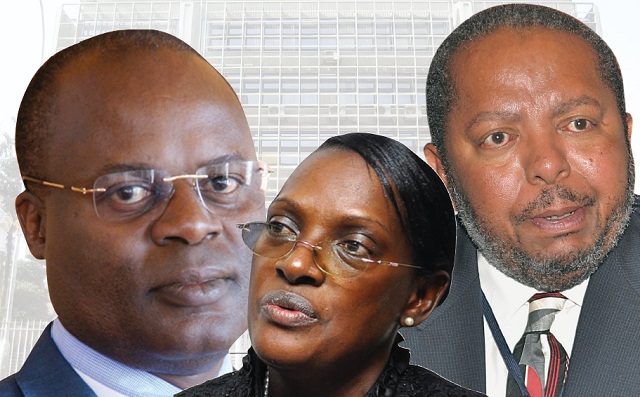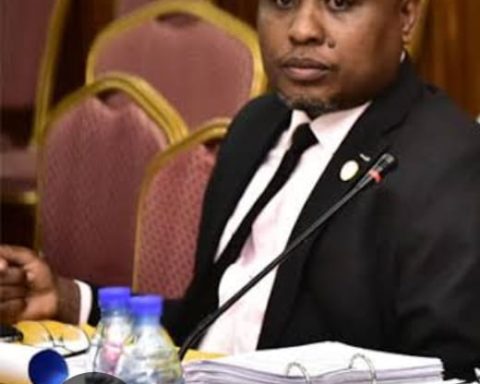How did Dr. Louis Kasekende, a man who was well on track to become a Governor end up spending the last 3 years of his 33-year career making headlines for all the wrong reasons?
Law No. 1 of 48 laws of power: Never outshine the master!
Make your masters appear more brilliant than they are and you will attain the heights of power. When it comes to power, outshining the master is perhaps the worst mistake of all.
The above, is an extract from a book, The 48 Laws of Power by American author Robert Greene. If you have not read this book- you should probably give it a try.
Perhaps, if Dr. Louis Kasekende, the most immediate Bank of Uganda Emeritus Deputy Governor had read it, or maybe he has ever read it- but if he had memorized and practiced this Law No. 1, he would probably still be at Bank of Uganda- perhaps not as a Governor yet, but the late Prof Emmanuel Mutebile’s Crown Prince of sorts; a Governor-in-waiting.
But well, things turned out different.
On January 14th 2020, a drained but still defiant Kasekende, quietly left Bank of Uganda’s second most powerful office, having handed over, the previous day to Mutebile, the man he had spent the previous 10 years working to replace. Without the usual extravagant champagne-studded send-off parties, befitting of a Deputy Governor, Kasekende, discreetly slid into retirement- from an institution he had served for 28 years and 13 of those as Deputy Governor.
Just like that!
In an email to staff, an unrepentant Kasekende, still refused to admit and or apologise for any wrongdoing or any role whatsoever in the various grave errors that senior Bank of Uganda officials, including himself were implicated in especially the shoddy and equally shady seizure, closure and sale of seven (7) commercial banks.
“We have jointly achieved a lot and should be proud of the tremendous progress for the future of our bank and our country,” he wrote, choosing to avoid the big elephant in the room- the underhanded closure of 7 banks, and perhaps the reason why his contract was not renewed- as yet.
In fact throughout the whole closed defunct banks scandal, only Kasekende remained defiant- the Auditor General found several gross acts of negligence as well as irregularities and illegalities and so did the Parliamentary Public Accounts Committee on Commissions, State Authorities and State Enterprises (PAC – COSASE).
A perhaps cleverer Mutebile throughout the parliamentary probe, decided to take an apologetic stance and at some point publicly acknowledged to PAC-COSASE, that BoU had erred on several instances and promised sweeping changes at BoU after the probe.
A remorseful Mutebile then told COSASE that the probe had “highlighted the shortfalls within our processes, policies and practices” and was “a learning process not only for the Management but also for the staff who followed the proceedings closely.”
Even the International Monetary Fund (IMF) in their May 2019, Country Report No. 19/125 admitted that following the parliamentary probe, “Bank of Uganda should step up the enforcement of the findings of weaknesses in the banks’ internal audit, controls and compliance.”
But a stubborn Kasekende would hear none of this. On April 17, 2019, two months after the parliamentary report, an overconfident Kasekende told a Bank of Uganda organised Town Hall Meeting in Jinja Town and indirectly to those baying for his blood that the parliamentary probe committee recommendations were some sort of “bureaucratic and static procedural guidelines in the resolution of financial institutions” and said that the “current supervision and resolution framework may not be perfect but it has served this country well.”
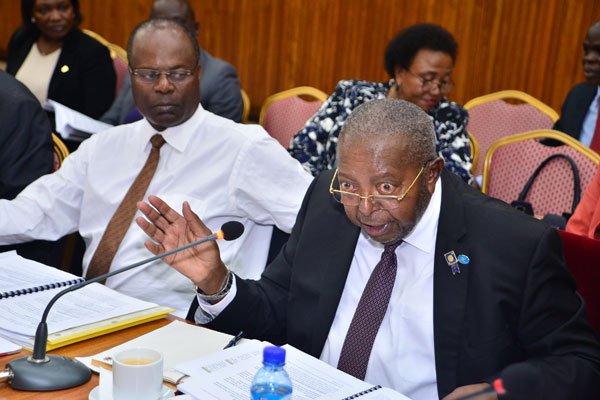
It shall be recalled that from the very onset, of the probe, Kasekende had vehemently opposed the parliamentary probe and at some point invoked the Office of the Attorney General, but a then equally resolute Parliamentary Speaker, Rt. Hon. Rebecca Kadaga, saw the probe through.
But how did a Kasekende, whose high flying 33-year career saw him become an Executive Director to the World Bank as well as an African Development Bank (AfDB) Chief Economist finally end up at the bottom of the heap? How did a man who was well on track to become a Governor end up becoming the opposite, spending his last term facing probes and making headlines for all the wrong reasons?
Of Mutebile’s 9 lives and Kasekende’s excessive ambition to become Governor
Kasekende joined the Bank of Uganda in 1986, worked his way up the ladders, eventually becoming Director of Research and then Executive Director of Research and Policy, rising to the post of Deputy Governor between 1999-2002.
As Deputy Governor, he also doubled as Vice Chairman of the BoU Board.
Between 2002 and 2004, Kasekende was seconded to the World Bank by the Uganda government to serve as the Executive Director to the World Bank, representing twenty-two African countries, including Uganda, on the bank’s executive board. On return from the World Bank, on November 1st 2004, he resumed his duties as Deputy Governor till April 2006.
From May 2006 to 2009, he served at the offices of the African Development Bank (AfDB), in Tunis, Tunisia, as AfDB’s Chief Economist. In January 2010, Kasekende returned to Uganda and was re-appointed Deputy Governor of the Bank of Uganda, to serve a 5-year term.
Analysts and those knowledgeable about Bank of Uganda affairs say that after a stint at World Bank and AfDB, Kasekende’s power ambitions were tickled. He somehow started seeing himself as Mutebile’s natural successor and everything seemed to work in his favour- he was a BoU raised man who knew his way around the corridors. He had made some good friends at World Bank and AfDB too.
Secondly, Mutebile’s second term as Bank of Uganda Governor was ending in January 2011 and word on the street was that the President was not renewing it. Since Mutebile’s predecessor, Charles Nyonyintono Kikonyogo had served two terms- from 1990-2000, it was believed that Mutebile too, would do two terms, paving way for Kasekende.
However, this was not to be. President Museveni, in a September 21, 2010 letter, reappointed Mutebile for a third 5-year term as Governor. Kasekende would have to wait for a second chance in 2016, when Mutebile’s term would expire.
Those in the know however say, as he waited he started building a powerbase within the Central Bank and use this network of allies to boost his chances even if this meant undermining his boss. But this would eventually be his worst mistake and greatest undoing.
According to a February 2019 Report of the Presidential Tripartite Committee to President Museveni about various issues at Bank of Uganda, indeed said that Kasekende was building a powerbase around himself built on both tribal and religious grounds. The committee was formed to among others investigate Mutebile’s 7th February 2018 decision to hire six new senior BoU executives, promote nine staff members to Assistant Director level as well as fire Justine Bagyenda the powerful former Executive Director, Bank Supervision.
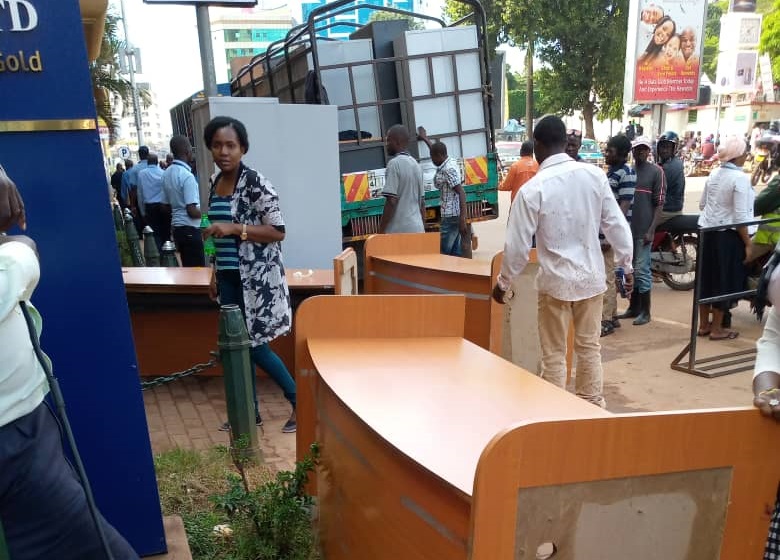
“There is a risk of divisions according to religion in that Bank. Catholics and Anglicans have their own groups. They have meetings and each has its own power,” noted the Hon. Abdu Katuntu (MP) chaired committee.
The same was confirmed by Ms. Josephine Okwi Ossiya, one of BoU’s board members who told the committee that: “there seems to be camps where a group allies with the Deputy Governor and the other with the Governor.”
Insiders say, Kasekende’s camp, included among others, Justine Bagyenda, Margaret Kasule, the Head of BoU’s Legal Department and Mr. Benedict Ssekabira the Director, Commercial Banking Department.
Ossiya however noted something else. According to her, it appeared that part of the so-called conflict between Kasekende and Mutebile had been cultivated by some staff within the bank for their own benefits.
“WHETHER THERE IS A REAL CONFLICT BETWEEN THE TWO – BECAUSE YOU SEE THEM (MUTEBILE AND KASEKENDE) INTERACT, IT DOES NOT SEEM TO BE – OR THE STAFF HAVE TAKEN ADVANTAGE OF THAT TO TRY AND PUSH THEIR OWN AGENDA, I HAVE NOT GONE TO THAT DETAIL. HOWEVER, THERE SEEMS TO BE AN APPARENT DIVIDE WHERE THERE ARE THOSE WHO RALLY – WHEN THEY WANT THIS THING DONE THEY WILL GO TO THE GOVERNOR AND OTHER GROUPS TO THE DEPUTY GOVERNOR,” SHE OBSERVED.
An apparently power-hungry Kasekende perhaps did not seem to realise that while he sought to build a powerbase around him, some of the senior executives especially Bagyenda, Kasule and Ssekabira, working with a network of city lawyers had built a lucrative cartel around identifying troubled banks, choking them to death and selling them on the cheap. This mafia operation needed a well-placed god-father and a power-hungry Kasekende fitted the role. As Deputy Governor, he was also vice chair of the bank’s board. Given Mutebile’s failing health and advanced age, a healthier and younger Kasekende was often the man in charge- a powerful No.2 and Governor in waiting.
In fact by the time Kasekende returned in 2010, Bagyenda, Kasule and Ssekabira had an ongoing lucrative deal they were eating from- a deal where Bank of Uganda, working with some lawyers, had sold assets (loans) belonging to International Credit Bank (ICB), Greenland bank, Cooperative Bank Assets (loans) amounting to UGX135 billion to a M/S Nile River Acquisition Company at $5.25m (UGX8.9billion). The sold assets included UGX34 billion of loans that had valid, legal and equitable mortgage supported by proper legal documentation. According to the Auditor General, the UGX8.9billion sale price, represented 26% of the total secured loan portfolio and 7% of the total loan portfolio.
Although this deal had been successfully woven and executed while Kasekende was on secondment to AfDB, it needed Kasekende’s cover to keep away any prowling eyes.
But as he would soon discover, his decision to ally with the infamous trio would soon suck him into the maze and grand-theft-auto like scheme that became of the September 2012 closure of National Bank of Commerce, the July 2014 closure of Global Trust Bank, and October 2016 closure of Crane Bank. One school of thought says that although he initially was not directly involved in the dirty deals, his failure to take action eventually made him so exposed, that taking part or not taking part in the dirty deals carried the same amount of risk.
By the time Mutebile was reappointed as Governor in January 2016, it appears Kasekende had given up all hopes of ever replacing Mutebile but also, was by then deeply compromised by his allies and was now almost like them.
What had initially started as a power-building move had eventually gotten Kasekende’s hand deeply involved with the irregular, illegal and shady closure of the above three banks. So deep was he involved that he was named in a Federal Bureau of Investigation (FBI) probe as having been involved in a plot, together with an unnamed BoU official and Mrs. Edith Kutesa (wife of powerful Foreign Affairs Minister, Hon Sam Kutesa) to secretly sell off Crane Bank, 19 months before it was taken over by BoU, to CEFC China Energy Company a Chinese conglomerate. Kasekende is also reported to have met the said Chinese Officials on May 10th 2016 at the Kutesa’s house.
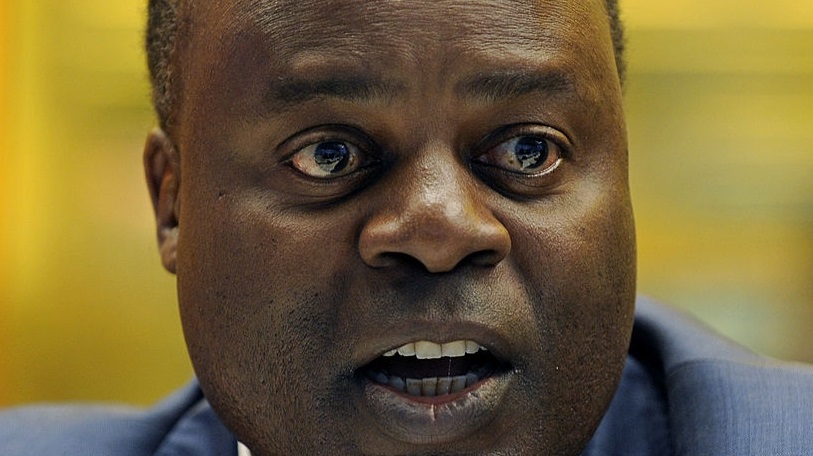
This FBI revelation fits into testimonies by the respective shareholders of the various closed banks, that BoU officials would deliberately make it difficult for troubled banks to recover from their challenges and would then like bloodthirsty vultures, move in to swiftly sell them on the cheap and often in complete disregard of the set down laws on how to resolve troubled banks as laid out in the Financial Institutions Act 2004.
While on the face of it, BoU was saving depositors, there was also an opportunity to make some quick cash especially through discounted sale off non-performing loans, many of which were secured. Often, law firms, linked to BoU and their allies as well as audit firms, would be handpicked for lucrative deals, to manage the closure and recovery on the bad assets and a killing would be made behind the scenes.
This is probably why it was Kasekende and not Mutebile who fought so hard to stop Parliament from investigating what the MPS would later find out was the irregular and illegal sale of several banks especially those sold post 2010, yet he was willing to let the MPs investigate the sale of the other banks sold while he was the Executive Director of Research.
This website tried to inquire from Kasekende on the extent of his involvement with the Crane Bank sale and particularly the FBI findings, but for five years now, he has never responded to this inquiry despite having received it.
Once Kasekende was exposed and caught knee-deep in the bank closure crisis, Mutebile found it easy to strike hard at Kasekende’s bloc sending it into disarray in the Mutebile’s 7th February 2018 decision. In the move, he fired Bagyenda whose contract had a few months left and replaced her with Tumubweine Twinemanzi. Several of other Kasekende’s people were moved to less powerful positions and replaced either by their juniors or by outsiders.
Although this further weakened Kasekende, the proceedings and later, the findings of the PAC-COSASE report; the resulting public wrath flamed by hundreds of negative news headlines and the fury of the affected closed banks’ shareholders, would be the last stroke that broke Kasekende’s reputation and eventually his career.
He would spend the next 3 years of his third term as Deputy Governor making negative headlines, his image a shadow of its former self and keeping a low profile. When his time finally came to an end, Kasekende- vulnerable, crestfallen and abandoned, but still defiant to the end, quietly slid into his semi-retirement.
Nobody knows what’s next for him. Probably he too, doesn’t know yet, because his mistakes and greed for power make it difficult for him to directly have any role to play in the financial services sector. Secondly it is still hoped that government will act on the PAC-COSASE report and Court rulings on Sudhir Vs BoU case to hold those found culpable.
There is however, another angle that seems to suggest that Kasekende may still be reappointed- but pundits say, this is just a 10-20% chance.
****
Story Credit: CEO East Africa
![]()

